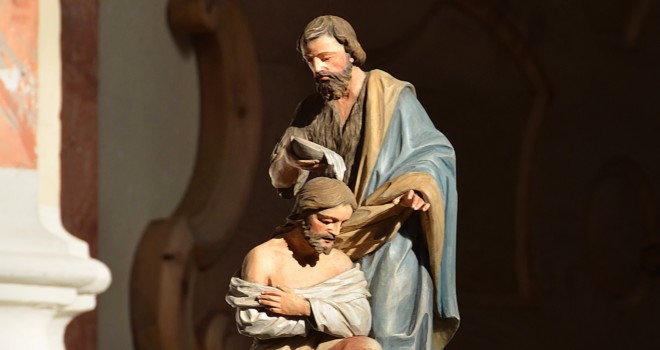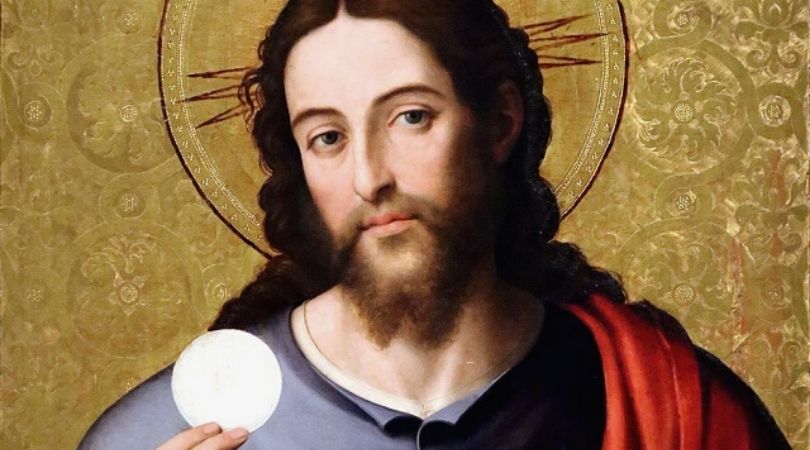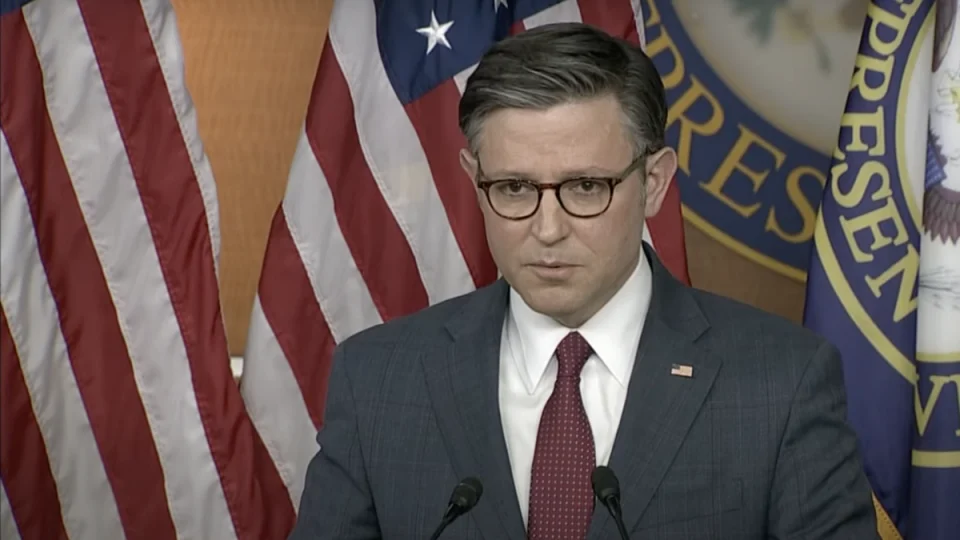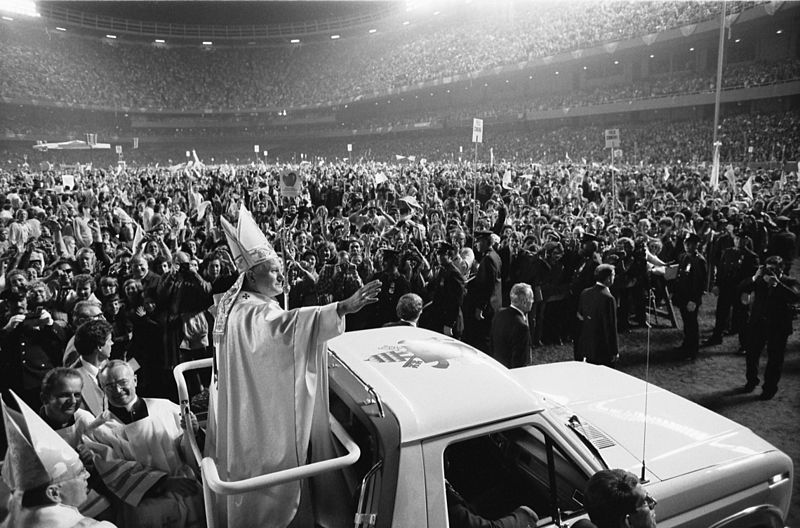Jonathan B. Coe: Christ Fulfills All Righteousness In His Baptism

Tony Perkins: An Obamacare Fee-for-All
January 12, 2019
Viganò Vindicated: Wuerl Knew About McCarrick Abuse as Early as 2004 by Lisa Bourne
January 12, 2019
--
By Jonathan B. Coe, Catholic Exchange, January 11, 2019
Before being tempted by the devil while fasting and praying in the wilderness, Christ was baptized by John the Baptist (Mt. 3:13-17). Initially John balked at the request of his cousin saying, “I need to be baptized by you,” but Jesus convinced him by saying that “it is fitting for us to fulfill all righteousness.”
St. Thomas Aquinas is on-target in asserting that this story points to the Sacrament of Baptism that Catholics celebrate. In citing Aquinas, Scott Hahn and Curtis Mitch say: “The water, Spirit, and divine voice signify the effects of Baptism whereby the soul is cleansed, the grace of the Holy Spirit is imparted, and the recipient is adopted as a beloved child of God.”
It’s also noteworthy that Jesus imitates Mary and Joseph in their agenda “to fulfill all righteousness.” Luke sums up Joseph’s and Mary’s sanctity in the presentation of Christ in the temple: “And when they had performed everything according to the law of the Lord, they returned into Galilee, to their own city, Nazareth” (Luke 2:39; emphasis mine).
Because he was sinless, Jesus really had no need to baptized. We see something similar in Mary’s life on the Day of Pentecost: she followed her Son’s command to be present at Pentecost (Acts 1:14) even though she was filled with the Holy Spirit from conception.
We also see an impressive level of sanctity in the lives of Zechariah and Elizabeth: “And they were both righteous before God, walking in all the commandments and ordinances of the Lord blamelessly.” Such luminous lives should encourage the fervent devotion of practicing Catholics today in adhering to the teaching of the Magisterium and in living a fully catechized life in their mind, will, emotions, and bodies.
Unfortunately, this is often what we don’t find among American Catholics. Though self-identified Catholics make up about 68.1 million (20.8%) of the population of the United States, only about one-third attend Mass once a week.
Of this one-third, many are not catechized and have heterodox beliefs and practices:
In a recent Pew Research Center study, 58% who attend Mass weekly believe that divorced and remarried parishioners, who have not been through the annulment process, should be allowed to receive Communion; 42 percent think that co-habiting couples should be able to partake of the Eucharist, and only 46 percent think that pre-marital sex is a sin.
This is a far cry from “fulfilling all righteousness,” and highlights what Christ himself said about the straight and narrow path: “few there be that find it” (Mt. 7:13,14). Despite this reality, it is till incumbent on all of us — prelates, priests, and laity — to do everything we can to see self-identified Catholics become disciples of Christ.
There are dragons in the landscape, to borrow a title from a Michael O’Brien book. A good place to start might be to simply recognize all the obstacles that the self-identified Catholic faces in making the journey to full devotion.
We fight enemies within us and enemies outside of us. Jesus said, “If you love me, keep my commandments.”
St. Thomas said that there are four main substitutes for God: wealth, pleasure, power, and honor. To the degree that the heart of the Catholic has an inordinate love for any of these four things, he will not be able to love Christ and fulfill all righteousness.
This goes back to the Garden of Eden and what we inherited from Adam and Eve: Autonomy. Autonomy means departing from the clear teaching of Scripture and Tradition as articulated by the Magisterium.
Adam and Eve received a clear command from God: “Don’t eat of the Tree of the Knowledge of Good and Evil.” The serpent’s promise that, in doing so, they would become like gods was another way of saying, “You’re going to love being autonomous; you’re going to love being your own god.”
Israel followed in Adam and Eve’s footsteps during the time of the Judges when there was no king in Israel and everyone did what was right in their own eyes (Judg. 21:25). This fallen tendency was warned against in ancient Hebrew wisdom: “There is a way which seems right to a man but its end is the way to death” (Prov. 14:12).
Thus, there is a pull towards Autonomy within us that the sacramental life, when done with sincerity, consistency, and faith, seeks to reverse. The cultural influence outside of us often encourages this autonomous impulse.
In the broader American culture, we are often encouraged to “follow your heart,” and, as Oprah Winfrey did at the 75th Golden Globe Awards, embrace “your truth.”
The wildly popular book, Eat, Pray, Love, by Elizabeth Gilbert, encourages the reader to listen to “the god within.” Ross Douthatargues that “the god within” isn’t a divine voice at all, but an amplified human voice that caters to our self-love.
A major part of this cultural landscape is putting feelings above all else. The dictatorship of feelings doesn’t always lead us to submit to the Magisterium.
For example, on Mondays, I often eat next to nothing all day and break my fast in the evening in an effort to subjugate my flesh to my mind and will, which is, in turn, under the Lordship of Christ. If I appealed to my feelings, I’d last about 5 minutes.
Sometimes the Church is indistinguishable from the culture and greatly mitigates against the individual Catholic becoming a fully-catechized disciple. Take, for example, the ministry of Father James Martin, another dragon in the landscape.
Martin is a sought-after speaker who has international influence inside and outside the Church. He tells LGBT people that “God made them [wonderfully] that way;” that same-sex couples should be able to kiss during Mass; that the Church should reverence same-sex unions; and that being against same-sex unions is like being a racist.
Another cultural message that erodes submission to the Magisterium and fulfilling all righteousness is: “I’m not religious; I’m spiritual.” This attitude looks at the Catholic faith and criticizes it for “all the ritual, rote, repetition, pomp, and circumstance” and seeks a simplified relationship with God that is free of institutional constraints.
The truth is that if you attend Mass and don’t understand the meaning behind the liturgy and ritual, it is an empty experience for the attendee. It’s like the famous comedian Don Rickles said about his Catholic friends in a stand-up routine: “I see them making the sign of the cross. I’m Jewish; I see them do that and I think it means ‘Not a through street.’”
The assertion “I’m not religious; I’m spiritual” is often rooted in the Autonomy that was discussed earlier. It means that rather than submitting my life to a divine text and a sacred Tradition, I will customize my own “spirituality” to suit my agenda.
I sometimes run into a Christianized version of this out here in the Pacific Northwest. Nature becomes their cathedral, and, without belonging to any particular church, they seek to craft a faith on their own through their own interpretation of Scripture and “personal relationship” to Christ.
We should have compassion on those who have been hurt by bad priests. For many who have damaged emotions because of corrupt and/or depraved clergy, it is a crisis of authority.
It’s sometimes difficult to submit to the Magisterium when the shepherds of the flock have wandered far from the straight and narrow. Broken wings take time to heal.
This is why Christ said, “… whoever causes one of these little ones who believe in me to sin, it would be better for him to have a great millstone fastened round his neck and to be drowned in the depth of the sea” (Mt. 18:6). Our prayers should rise like incense for the victims of bad priests and prelates and we should continue to do three things during this time of scandal: pray the Rosary, pray the Rosary, pray the Rosary.
None of us are immune from the various temptations and pitfalls that have been underscored in this essay. An instructive image emerges from the Apothegmata: Saint Anthony comes out of his hermitage in the Egyptian desert and looks out and sees the many snares of the devil spread out over the entire world.
He cries out to heaven: “My God! How can anyone be saved?” A voice responds from heaven: “Humility.”
God opposes the proud but gives grace to the humble (James 4:6). The grace-filled, sacramental life is our only hope amidst what the apostle Paul called “a crooked and perverse generation” (Phil. 2:15).
image: Herzi Pinki [CC BY-SA 3.0 at], from Wikimedia Commons




